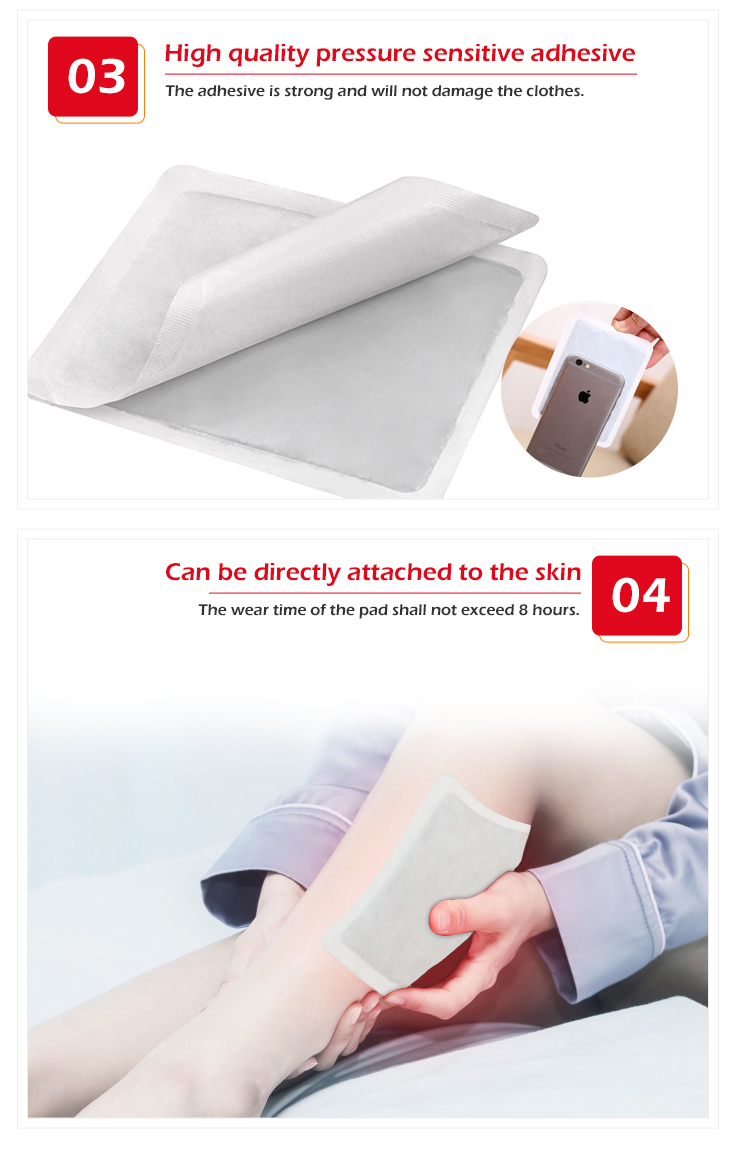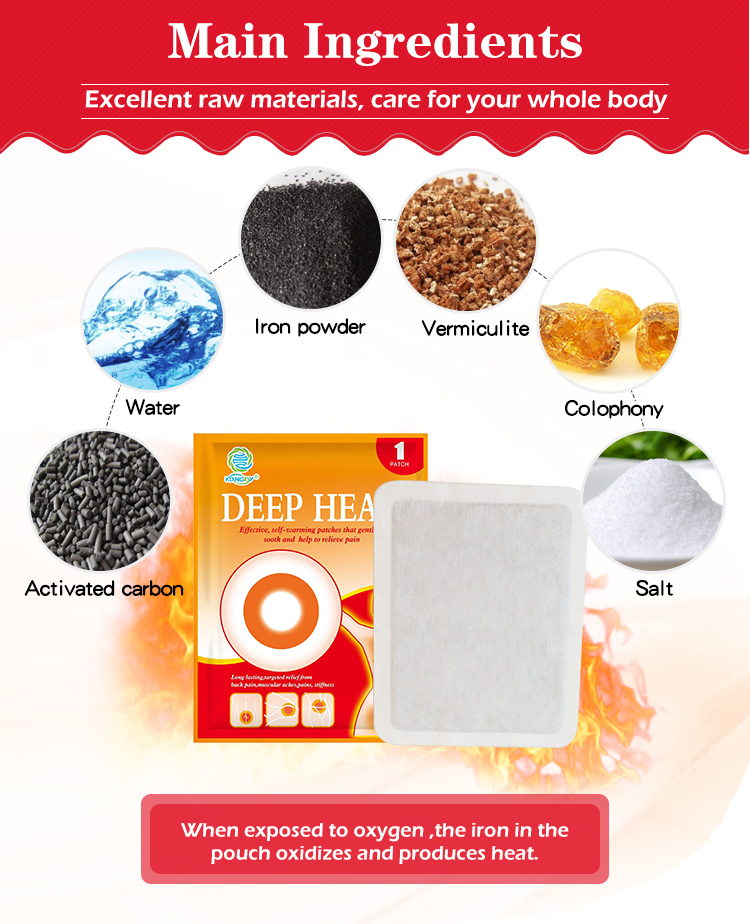What Certifications Should a Deep Heat Patches Manufacturer Have?
When selecting a Deep Heat Patches Manufacturer for your brand, ensuring that they possess the proper certifications is essential for both quality assurance and regulatory compliance. Certifications not only reflect a manufacturer’s commitment to high standards but also provide your customers with confidence in the product’s safety and effectiveness. In this guide, we’ll explore key certifications that any reputable Deep Heat Patches OEM should have, as well as how these certifications can impact your business’s credibility and market success.

Why Are Certifications Important for Deep Heat Patches Manufacturers?
Certifications are an important benchmark for assessing a Deep Heat Patches Manufacturer’s capabilities. They serve as proof that the manufacturer meets recognized standards in safety, quality, and environmental responsibility. For brands looking to launch custom deep heat patches or develop private label deep heat patches, choosing a certified deep heat patches supplier ensures that the products meet regulatory standards and can be marketed with confidence.
Some benefits of working with a certified manufacturer include:
- Compliance with Regulatory Standards: Certifications often mean compliance with regional and international regulations, essential for legal market entry.
- Product Safety and Quality: Certifications confirm that the manufacturer follows best practices for quality control, safety, and efficacy.
- Customer Confidence: Certification marks are a symbol of trust, making customers more likely to buy a product with verified quality.
- Reduced Liability Risks: Certified manufacturers are less likely to encounter safety issues, reducing potential liability for your brand.
Essential Certifications for a Deep Heat Patches Manufacturer
Let’s look at some of the most critical certifications to consider when choosing a Deep Heat Patches OEM. Each certification provides assurance for a different aspect of the manufacturing process, from product safety to environmental responsibility.
1. Good Manufacturing Practices (GMP) Certification
Good Manufacturing Practices (GMP) certification is a basic but essential certification that a deep heat patches supplier should have. GMP standards ensure that products are consistently produced and controlled according to quality standards, covering aspects such as:
- Hygiene and cleanliness in manufacturing environments
- Product consistency across batches
- Rigorous quality control checks and protocols
With GMP-certified custom deep heat patches, you can rest assured that the products are made under strict quality control, reducing the risk of contamination and ensuring product consistency. This certification is essential for maintaining a brand’s reputation and ensuring product safety.
2. ISO 9001: Quality Management System
ISO 9001 is a globally recognized quality management system certification that emphasizes continuous improvement, customer satisfaction, and adherence to regulatory requirements. For deep heat patches manufacturers, ISO 9001 certification means:
- Commitment to high-quality production standards
- Consistent performance and reliability
- Systematic quality control measures
ISO 9001 certification can assure that the deep heat patches OEM maintains a high standard in production quality, which is crucial when developing private label deep heat patches that require consistent results across all batches.
3. ISO 13485: Medical Devices Quality Management
ISO 13485 is a more specific quality certification designed for manufacturers of medical devices. Given that deep heat patches are often classified as medical devices in many regions, ISO 13485 certification is an important credential that indicates:
- Adherence to medical device regulations and standards
- Risk management protocols for health and safety
- Rigorous testing and quality checks for medical-grade products
ISO 13485 certification reassures you that the deep heat patches supplier is equipped to produce products that meet strict health and safety standards, which is essential for high-risk products like pain relief patches.
4. CE Marking (European Compliance)
The CE Mark is a certification mark that indicates a product’s compliance with European health, safety, and environmental protection standards. For brands looking to enter the European market with custom deep heat patches, the CE Mark is essential. It covers several aspects:
- Conformity with EU health and safety regulations
- Approval for sale within the European Union
- Assurance of product safety and environmental responsibility
Only certified manufacturers can affix the CE mark, so partnering with a Deep Heat Patches OEM that already holds this certification can ease your brand’s entry into the European market.
5. FDA Registration (U.S. Market)
In the United States, pain relief patches like private label deep heat patches are often regulated by the Food and Drug Administration (FDA). FDA registration is not necessarily a certification, but it does confirm that the deep heat patches manufacturer is registered with the FDA and follows specific standards. FDA registration includes:
- Compliance with U.S. health and safety standards
- Adherence to production guidelines for over-the-counter (OTC) medical products
- Regular audits and inspections to ensure quality and safety
Choosing an FDA-registered deep heat patches supplier can simplify the approval process for selling your product in the United States.
6. ISO 14001: Environmental Management
ISO 14001 is a certification focused on environmental management, making it valuable for brands that prioritize sustainability. This certification demonstrates that the deep heat patches manufacturer:
- Actively manages and reduces environmental impact
- Implements eco-friendly practices in production
- Minimizes waste and conserves resources
ISO 14001-certified manufacturers align well with environmentally conscious brands and are more likely to engage in sustainable sourcing and waste management practices. This can be an appealing quality for customers who value sustainability.
7. Allergen-Free and Hypoallergenic Certifications
For brands targeting customers with skin sensitivities, look for deep heat patches OEM suppliers with allergen-free or hypoallergenic certifications. These certifications, often from third-party dermatological agencies, confirm that the products:
- Use materials less likely to cause allergic reactions
- Undergo dermatological testing for sensitive skin
- Avoid common allergens, such as parabens or certain adhesives
Hypoallergenic certifications give consumers confidence that your custom deep heat patches are safe and gentle, making your brand accessible to a broader market.
How to Verify Certifications of a Deep Heat Patches Supplier
Ensuring that a deep heat patches manufacturer possesses these certifications is crucial, but it’s equally important to verify their validity. Here are some practical steps:
- Request Documentation: Ask for copies of certifications and confirm their authenticity with the certifying body.
- Check Online Registries: Many certification bodies provide searchable databases. For example, FDA and ISO certifications can often be verified online.
- Ask for Audit Reports: Some manufacturers are willing to share their latest audit reports, which can give insight into their compliance and quality standards.
- Read Client Reviews: If the deep heat patches supplier has a strong client base, check reviews or testimonials for additional confirmation of their certifications and performance.
Advantages of Partnering with a Certified Deep Heat Patches Manufacturer
Working with a certified deep heat patches OEM provides several advantages beyond product compliance. Here are some added benefits:
- Streamlined Market Entry: Certification can ease the process of regulatory approval, allowing you to enter markets like the EU or U.S. more smoothly.
- Higher Consumer Trust: Certification marks are a visible signal of quality, which can improve consumer perception and boost sales.
- Improved Product Quality and Safety: Certified manufacturers follow strict quality protocols, reducing the risk of product recalls or failures.
- Competitive Advantage: Working with a certified manufacturer can differentiate your brand from competitors, as customers often look for trusted certifications in health-related products.
Challenges with Certification and How to Overcome Them
While certifications are beneficial, they also come with challenges. Here’s what you might encounter and how to address these issues:
- Higher Production Costs: Certification standards often increase production costs. Solution: Work with your OEM to identify cost-effective materials and processes that still meet certification standards.
- Longer Development Timelines: Meeting certification requirements can slow down product development. Solution: Plan ahead and factor in extra time for certification compliance in your product timeline.
- Limitations on Ingredient Use: Some certifications restrict certain ingredients. Solution: Collaborate closely with your deep heat patches manufacturer to develop formulations that meet both quality standards and certification guidelines.
Related Questions and Answers
1. What is a Deep Heat Patches OEM?
- A Deep Heat Patches OEM is an Original Equipment Manufacturer that produces deep heat patches according to your brand’s specifications, often providing options for ingredient and packaging customization.
2. How can I verify a Deep Heat Patches Supplier’s certifications?
- You can verify certifications by requesting documentation, checking certification registries, or reviewing audit reports.
3. Are certifications required to sell private label deep heat patches?
- While not always legally required, certifications improve product credibility and compliance, making market entry and customer acceptance easier.
4. Which certification is most important for quality control?
- GMP (Good Manufacturing Practices) and ISO 9001 are critical for ensuring consistent quality in production.
5. Can I choose a deep heat patches supplier without certifications?
- While possible, it’s riskier as uncertified suppliers may not adhere to strict quality or regulatory standards, which could harm your brand’s reputation.
In conclusion, choosing a deep heat patches manufacturer with the right certifications is a strategic investment that can enhance product quality, ensure regulatory compliance, and build consumer trust. Understanding which certifications are important and how they impact your product can help you make an informed choice and create a high-quality, reputable custom deep heat patch line.






